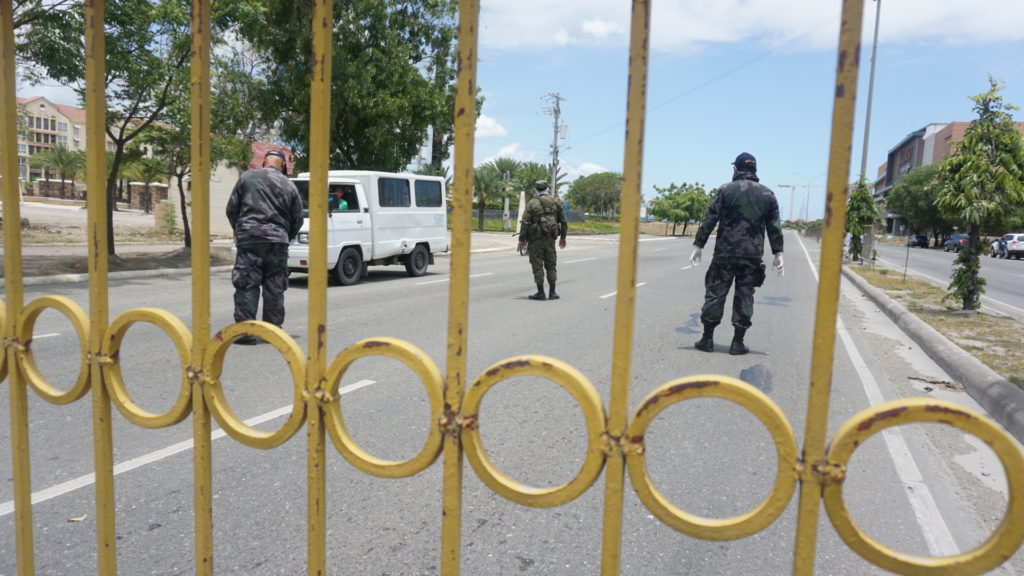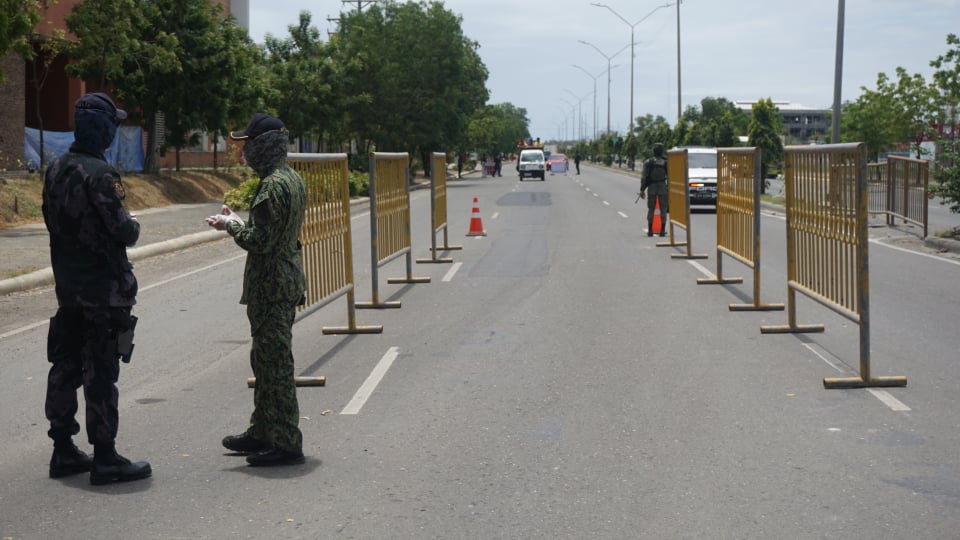
Minutes before the enhanced community quarantine in Cebu City, the police monitor the vehicles leaving Cebu City at its border with Talisay City on March 28, 2020. Talisay City also serves as the border between Cebu City and the territorial jurisdiction of Cebu province. Cebu City implemented its ECQ on March 28 while Cebu Province will implement its ECQ on March 30. | Gerard Francisco
CEBU CITY, Philippines — For the first time in peacetime history, Cebu province will be closing its borders tonight, Sunday (March 29, 2020) as it enters an enhanced community quarantine (ECQ) at 12:01 a.m. the next day, Monday (March 30, 2020).
With this, Cebuanos with no urgent activities and trips are advised to stay at home as a means to curb the transmission of coronavirus disease 2019 (COVID-19).
Cebu Governor Gwendolyn Garcia has issued and signed Executive Order (EO) No. 5-O which contains the guidelines and protocols in implementing the ECQ in the province.
The EO also sought a harmonized implementation of the guidelines among local governments in the province.
Border Controls
During the ECQ, law enforcers will be deployed at the borders of Cebu City and the territorial jurisdiction of Cebu province.
These are Talisay City in the south, Mandaue City in the north, and Balamban in the west.
By 12:01 a.m. on Monday, March 30, 2020, travelers coming from Cebu City will not be allowed to access any part of the province.
Likewise, those from the province will be barred from going to Cebu City.
Garcia in her earlier press conferences said the Capitol had decided to close its borders due to the increasing number of COVID-19 cases in Cebu City.
Several individuals, including health workers, are exempted from these rules. Click here for the full list.
Mandatory Home Quarantine
Except for those who are given exemptions, Garcia has ordered all residents in Cebu to stay at home.
When doing urgent activities such as shopping for basic necessities, Cebuanos should secure an ECQ pass or home quarantine pass from their local governments.
One pass is provided per household within a barangay.
See the list of exempted individuals from the mandatory home quarantine here.
Suspension of public transportation
With the ECQ in place, public transportation is suspended as a means to further restrict movement.
As a result, the Capitol has encouraged local government units (LGUs) to provide alternative modes of transportation for those, who have urgent itineraries but don’t have vehicles in doing so — provided that these will comply with strict social distancing.
But for private individuals with vehicles, they are encouraged to acquire a vehicle community quarantine pass from their local officials.
Similar to an ECQ pass, each household that owns at least one vehicle can be granted with a vehicle community quarantine pass.
Essentials and transactions
But even if the ECQ practically puts most aspects of normal life at a halt, Cebuanos are assured that the supply of goods and delivery of basic services will not be hampered.
The provincial government announced that there would be no restrictions for the movement of cargoes and other supplies.
Garcia ordered for establishments providing essential services, both from the public and private sectors, to remain operational.
The Capitol, however, encouraged that social distancing should also be observed in these companies and institutions, and that they should regulate the influx of individuals transacting as well as to trim down its operating hours.
These rules apply to a wide range of establishments, from local government offices and national government agencies to supermarkets, pharmacies, public markets, seaports, airports, and slaughterhouses.
Telecommuting and Construction Projects
Meanwhile, the governor has directed firms and other organizations operating within Cebu province to do work-from-home arrangements, and that only their skeletal workforce are allowed to report to their workplaces.
The provincial government also assured constructions firms and developers that their projects would continue but under one condition.
They advised companies undertaking construction projects to ensure that their workers would be sheltered during after work hours.
“Except for workers residing within the LGU where the construction project is being undertaken, the movement of workers shall be restricted to their bunkhouses and the construction site,” the EO stated.
“Construction workers in construction sites located within the City of Cebu but residing in the Province of Cebu shall be confined to the project sites of said city,” it added.
Assistance
The Capitol is also gearing up to provide assistance, especially to the underprivileged.
Garcia has ordered that the indigents and those living below the poverty line should be prioritized during the distribution of relief packs.
They are to be followed by those who lost their jobs due to COVID-19’s economic impact, senior citizens with no other means of income, and those under mandatory quarantine without any financial means.
“Gathering of beneficiaries in order to distribute said assistance is strictly prohibited,” the Capitol said.
The province has also tasked local governments to convert public school facilities as sites to house individuals suspected of having COVID-19 or persons under monitoring (PUMs)./dbs
